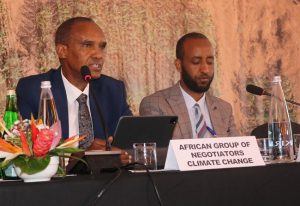At the close of the 10th special session of the African Ministerial Conference on the Environment (AMCEN), Ministers adopted the African common position, highlighting the continent’s key priorities for the upcoming 29th session of the Conference of the Parties (COP29) to the United Nations Framework Convention on Climate Change (UNFCCC).

AMCEN, an annual gathering of African Environment Ministers to discuss and strengthen environmental governance, was this year held from August 30 to September 6, 2024, in Abidjan, Cote d’Ivoire, under the theme: “Raising Africa’s Ambition to Reduce Land Degradation, Desertification, and Drought.”
Over the years, a key agenda of AMCEN is the African common position on climate change negotiations – a declaration containing key priorities and messages in the various themes of the climate negotiation process.
The need to unlock climate finance has, for years, dominated the discussions for Africa, and it was equally the case at this year’s session, at which the importance of climate finance was highlighted and reiterated.
It was reported that despite African countries submitting ambitious Nationally Determined Contributions (NDCs), there hasn’t been corresponding support for their implementation. To achieve their NDCs, African countries need an estimated $2.8 trillion between 2020 and 2030.
“As we head to COP29, the Africa group is prioritising the need for ambitious climate finance outcomes. We are particularly focusing on an ambitious New Quantified Goal on Climate Finance (NCQG) outcome that is based on evolving needs as reflected in developing countries’ NDCs, National Adaptation Plans, and other national climate planning and programming instruments.
“Our position includes: a quantum of $1.3 trillion per annum by 2030; quality of finance that is informed by criteria including debt sustainability, cost of borrowing, and significantly from public sources, thus emphasising grant and highly concessional finance; and transparent mechanisms in respect of accountability,” said Ali Mohamed, Chair of the African Group of Negotiators on Climate Change (AGN), in his presentation on Africa’s priorities.
The adopted AMCEN climate change decision further highlights the importance of adaptation to Africa, in the context of its well-known vulnerabilities to climate change, particularly in climate sensitive sectors such as agriculture and water, with cascading effects into the health sector.
“As highlighted in the 2023 State of Climate Report in Africa, the continent remains on the front lines of fighting climate change and its impacts; from rising temperatures to shifting rainfall patterns, and other extreme weather events. Consequently, key sectors such as agriculture, water and health are in dire straits. Crumbling agricultural productivity and production due to either droughts or floods, water scarcity and rising temperatures are not only causing food insecurity but also leading to serious health challenges for the people.
“Both health and climate experts keep highlighting nutrition-related challenges, heat stress, occurrence and increase of certain infectious diseases such as malaria and waterborne illnesses, among others. A deeper understanding on this nexus is a must for effective adaptation,” noted the AGN Chair.
Other key priorities for Africa contained in the adopted common position include: the call for the operationalisation of the Loss and Damage Fund to support African countries in coping with the irreversible impacts of climate change and aid in the recovery of affected communities; equitable just transition in the context of Africa’s unique needs and development circumstances; the need to launch work on Africa’s special needs and special circumstances recognising Africa’s vulnerability; and finalisation of rules for carbon markets that are robust and deliver environmental integrity and the long-term goals of the Paris Agreement.
Inger Andersen, UNEP Executive Director, said: “African nations need support from the international community. But, in the spirit of the September 2023 Africa Climate Summit, let us remind ourselves what African Heads of State noted: namely that Africa is a continent of solutions… This is a continent of solutions. Not victims. You are climate leaders, with solutions to our global crisis.”
Simon Stiell, UNFCCC Executive Secretary: “The continent has been warming at a faster rate than the global average. From Algeria to Zambia, climate-driven disasters are getting worse, inflicting the most suffering on those who did least to cause them. In Africa, as in all regions, the climate crisis is an economic sinkhole, sucking the momentum out of economic growth. In fact, many African nations are losing up to 5% of GDP because of climate impacts.”
Ibrahim Thiaw, UNCCD Executive Secretary: “As we speak, the Sahel is severely affected by floods notably in Niger, Nigeria, Burkina Faso, Mali and Sudan. There is hardly any year where floods, drought or loss of fertile land is not hitting the continent. It is heartbreaking to see that Zimbabwe, Malawi and Zambia –once breadbaskets – are listed among the most affected by malnutrition caused by drought. In Namibia, crippling drought is pushing both people and wildlife to the brink. The loss of productive land across the continent, coupled with the disruptions caused by the increased and erratic rainfall patterns, have reached such levels that young African men and women have no choice but to abandon their farms; flee their villages and their countries.”
Hanan Morsy, Deputy Executive Secretary and Chief Economist, United Nations Economic Commission for Africa: “Climate change is costing African economies up to 15% of GDP annually. Governments are diverting up to 9% of their budgets to cope with extreme weather, while grappling with debt distress, facing difficult trade-offs between climate action and meeting critical development needs, such as health and education.”
Aden Duale, Cabinet Secretary, Ministry of Environment, Climate Change and Forestry, Kenya: “Kenya is pursuing innovative policies and interventions designed to bolster resilience against the increasingly severe impacts of climate change, particularly droughts. In recent years, Kenya has faced significant challenges due to recurring droughts, which have threatened food security and strained water resources.”
